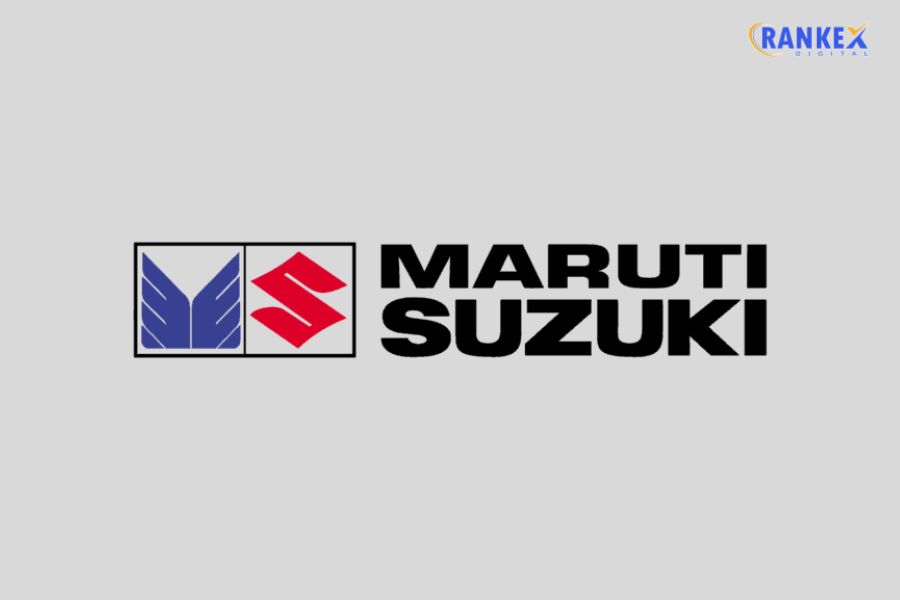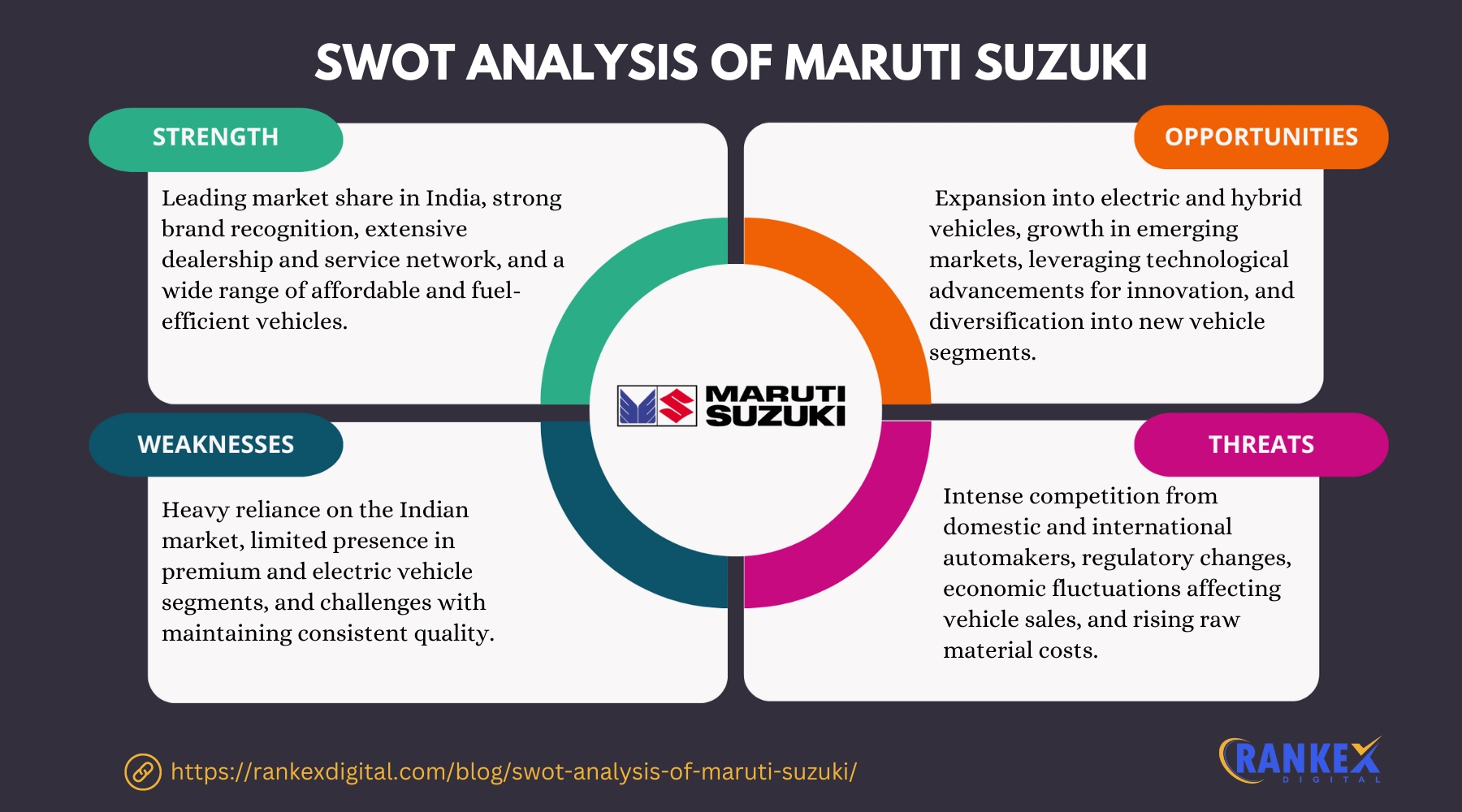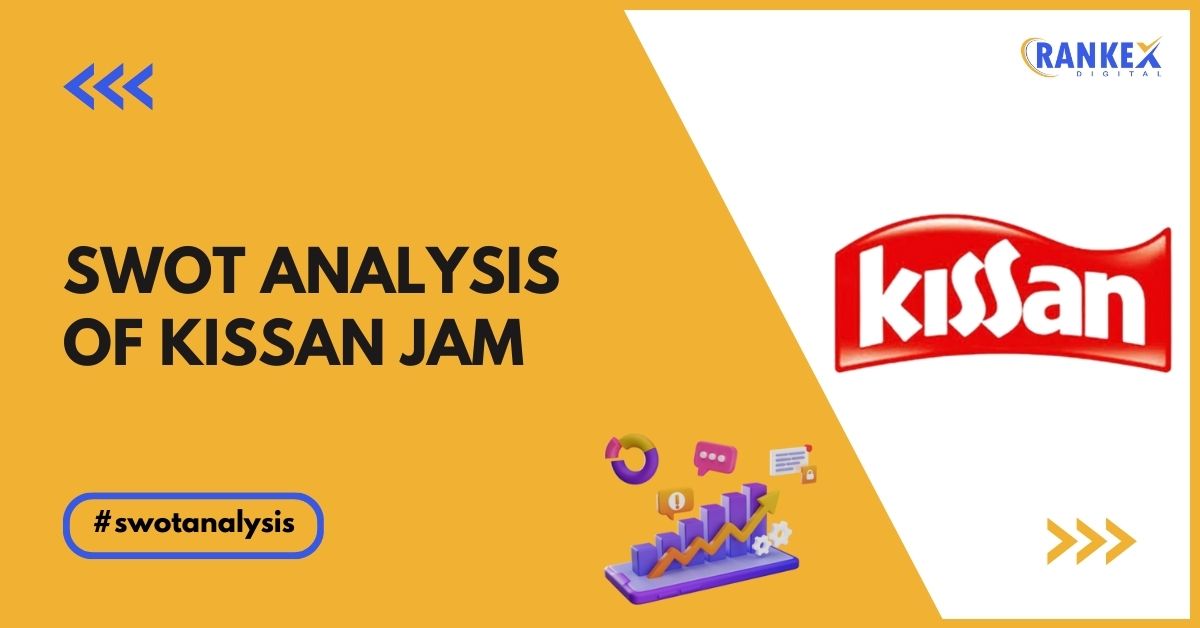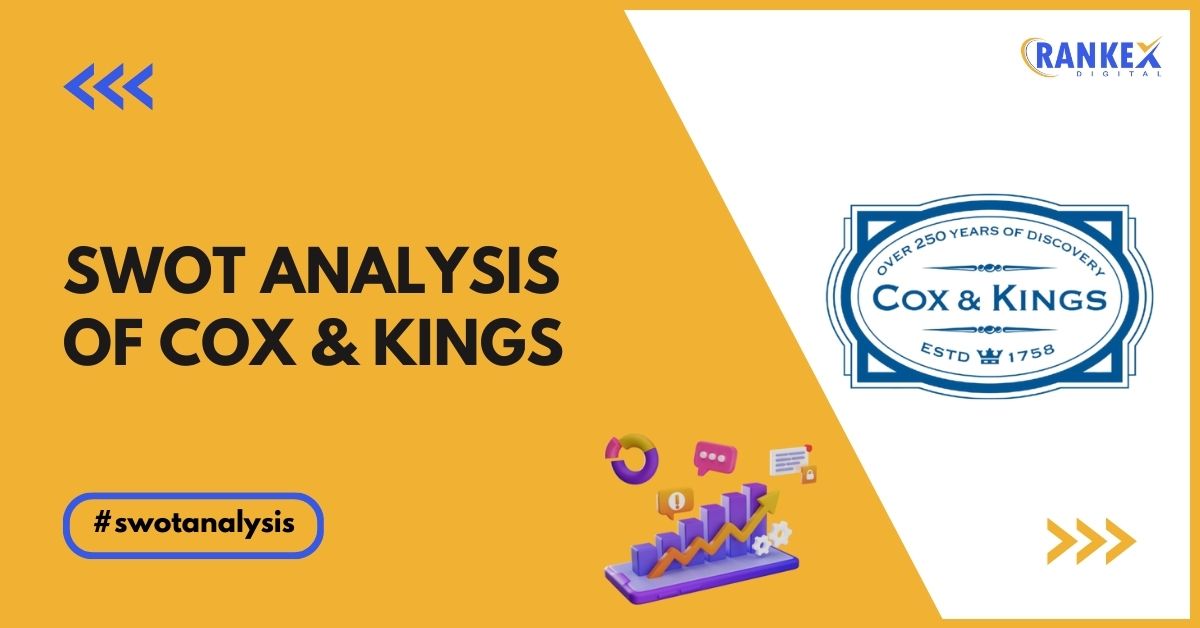Maruti Suzuki, a leading player in the Indian automotive market, is known for its extensive range of affordable and reliable vehicles. As a subsidiary of Suzuki Motor Corporation, Maruti Suzuki has dominated the Indian car market with a strong presence and extensive service network.
This SWOT analysis of Maruti Suzuki provides an updated look at the company’s strengths, weaknesses, opportunities, and threats.
In this blog
Overview of Maruti Suzuki

| Founder | Suzuki Motor Corporation (Acquired majority stake in 1981) |
|---|---|
| Year Founded | 1981 (in India) |
| Origin | Japan (Suzuki Motor Corporation) |
| Industry | Automotive |
| Annual Revenue | $12 Billion (FY 2023) |
| Employees | 40,000+ (India) |
Maruti Suzuki is renowned for its wide range of cars that cater to various segments, including hatchbacks, sedans, and SUVs. The company’s success in the Indian market is attributed to its strong brand presence, customer-centric approach, and extensive service network.
Current News on the Market on Maruti Suzuki
- New Model Launches: Maruti Suzuki has introduced several new models and updated versions of existing cars to cater to changing consumer preferences and meet emission norms.
- Electric Vehicle (EV) Development: The company is investing in electric vehicle technology, with plans to launch its first electric car in the coming years as part of its strategy to enter the EV market.
- Sustainability Initiatives: Maruti Suzuki is focusing on reducing its carbon footprint through eco-friendly manufacturing practices and promoting the use of alternative fuels.
- Expansion of Production Facilities: The company is expanding its production capabilities with new plants and upgraded facilities to increase output and improve efficiency.
- Strategic Partnerships: Maruti Suzuki is exploring partnerships with technology companies to enhance its digital capabilities and connectivity features in its vehicles.
SWOT Analysis of Maruti Suzuki

Strengths of Maruti Suzuki
- Strong Market Presence
Maruti Suzuki holds a dominant position in the Indian automotive market, with a significant share of the passenger car segment. Its extensive network of dealerships and service centers strengthens its market presence. - Brand Recognition and Trust
The brand is well-established and trusted by Indian consumers for its affordability, reliability, and fuel efficiency. Maruti Suzuki’s reputation contributes to strong customer loyalty and high sales volumes. - Extensive Product Range
The company offers a wide variety of vehicles, including hatchbacks, sedans, and SUVs, catering to different consumer needs and preferences. This diverse product portfolio helps Maruti Suzuki capture a broad customer base. - Efficient Supply Chain and Manufacturing
Maruti Suzuki’s efficient supply chain and manufacturing processes enable it to maintain cost competitiveness and high production volumes. The company’s facilities are equipped with advanced technology to ensure quality and efficiency. - Strong After-Sales Service Network
Maruti Suzuki has an extensive network of service centers across India, providing reliable and accessible after-sales service. This network enhances customer satisfaction and contributes to the brand’s strong market position.
Weaknesses of Maruti Suzuki
- Limited Presence in Premium Segments
Maruti Suzuki primarily focuses on the mass market, with limited presence in the premium and luxury segments. This gap in its product offering restricts its ability to tap into higher-margin markets. - Dependence on the Indian Market
A significant portion of Maruti Suzuki’s revenue comes from the Indian market. This heavy reliance on a single market makes the company vulnerable to economic fluctuations and regulatory changes in India. - Perceived Lack of Innovation
Compared to global competitors, Maruti Suzuki has been perceived as less innovative in terms of advanced technologies and features. This perception could impact its competitiveness in a rapidly evolving automotive landscape. - Environmental and Regulatory Challenges
Compliance with increasingly stringent environmental regulations and emission norms poses a challenge. Maruti Suzuki must continuously adapt its products and manufacturing processes to meet these regulatory requirements. - High Competition
The automotive industry in India is highly competitive, with numerous domestic and international players. Intense competition can impact market share and pricing strategies.
Opportunities for Maruti Suzuki
- Growth in the Electric Vehicle Market
The rising demand for electric vehicles presents an opportunity for Maruti Suzuki to enter the EV market and capture a share of this emerging segment. Investing in EV technology and infrastructure could drive future growth. - Expansion into Rural Markets
There is significant growth potential in India’s rural markets, where increasing disposable incomes and infrastructure development are driving demand for personal vehicles. Maruti Suzuki can expand its reach in these regions. - Focus on Digitalization and Connectivity
Enhancing digital features and connectivity in vehicles, such as infotainment systems and telematics, can attract tech-savvy consumers and align with industry trends towards smart mobility solutions. - Strategic Partnerships and Collaborations
Forming strategic partnerships with technology providers, automotive suppliers, and other stakeholders can help Maruti Suzuki accelerate innovation, improve product offerings, and enhance market competitiveness. - Sustainability and Green Technologies
Investing in sustainable technologies and green practices, such as hybrid vehicles and fuel-efficient engines, can improve Maruti Suzuki’s environmental footprint and appeal to environmentally-conscious consumers.
Threats to Maruti Suzuki
- Economic Volatility
Economic fluctuations, including inflation and changes in interest rates, can impact consumer spending and demand for automobiles. Economic uncertainty poses a threat to Maruti Suzuki’s sales and profitability. - Regulatory and Policy Changes
Changes in government policies, such as stricter emission norms and tax regulations, can affect Maruti Suzuki’s operations and product offerings. Adapting to these changes requires ongoing investment and strategic adjustments. - Rising Raw Material Costs
Volatility in the prices of raw materials, such as steel and plastics, can impact production costs and profit margins. Maruti Suzuki must manage these cost fluctuations to maintain financial stability. - Intense Competition
The automotive industry is highly competitive, with numerous players offering a range of products. Intense competition from both domestic and international brands can impact Maruti Suzuki’s market share and pricing strategies. - Technological Disruptions
Rapid advancements in automotive technology, such as autonomous driving and electric propulsion, present a threat if Maruti Suzuki fails to keep pace with technological developments and consumer expectations.
Competitors of Maruti Suzuki
- Hyundai Motor India
Hyundai is a major competitor in the Indian automotive market, offering a diverse range of vehicles and advanced features. It competes with Maruti Suzuki across various segments. - Tata Motors
Tata Motors provides a range of passenger and commercial vehicles, including electric vehicles. It competes with Maruti Suzuki in multiple segments of the automotive market. - Honda Cars India
Honda is known for its premium and high-quality vehicles, competing with Maruti Suzuki in segments such as sedans and SUVs. - Mahindra & Mahindra
Mahindra focuses on SUVs, trucks, and electric vehicles. Its product offerings compete with Maruti Suzuki’s SUVs and utility vehicles. - Toyota Kirloskar Motor
Toyota provides a range of vehicles, including hybrid models, and competes with Maruti Suzuki in the mid-to-premium segments of the market.
Conclusion
The SWOT analysis of Maruti Suzuki highlights its strong market presence, brand recognition, and extensive product range as key strengths.
However, the company faces challenges such as limited presence in premium segments, dependence on the Indian market, and intense competition.
By leveraging opportunities in the electric vehicle market, rural expansion, and digitalization, while addressing threats from economic volatility and regulatory changes, Maruti Suzuki can continue to strengthen its position in the automotive industry and drive future growth.
Frequently Asked Questions
1. What are Maruti Suzuki’s main strengths?
Maruti Suzuki’s main strengths include its strong market presence, brand recognition, extensive product range, efficient supply chain and manufacturing, and robust after-sales service network.
2. How does Maruti Suzuki address competition in the automotive market?
Maruti Suzuki addresses competition by continually updating its product lineup, expanding its service network, investing in new technologies, and maintaining cost competitiveness through efficient manufacturing processes.
3. What opportunities does Maruti Suzuki have for growth?
Opportunities for Maruti Suzuki include entering the electric vehicle market, expanding into rural areas, focusing on digitalization and connectivity, forming strategic partnerships, and investing in sustainability and green technologies.
4. What are the major threats to Maruti Suzuki?
Major threats include economic volatility, regulatory and policy changes, rising raw material costs, intense competition, and technological disruptions.
5. Who are Maruti Suzuki’s main competitors?
Maruti Suzuki’s main competitors include Hyundai Motor India, Tata Motors, Honda Cars India, Mahindra & Mahindra, and Toyota Kirloskar Motor, each offering diverse products and competing in various segments of the market.











